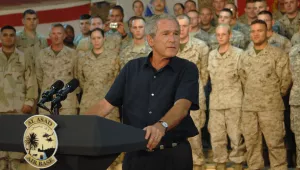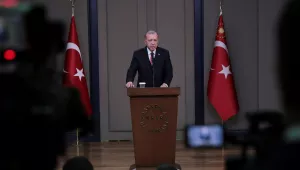1. Based on your research, how did the United States' handling of the Iraq War compare to other historical examples of forced regime change?
There are a lot of similarities. First, foreign-imposed regime change is commonly undertaken by powerful states, usually great powers, against relatively weak targets. The U.S., for example, has imposed several regimes in the Caribbean Basin, the British tried to impose puppet rulers twice in Afghanistan, and Russia has intervened in Iran multiple times. Actually, the frequency with which great powers attempt to impose governments in weak states is somewhat surprising if you consider that states with a preponderance of power shouldn't need to invade weak states to get cooperation. Strong states should be able to rely primarily on coercive threats. And we would expect that coercion would be most successful when power is asymmetric. But if states have to resort to force, if they have to remake the targeted state's government to get what they want, then it's a clear sign that coercion has failed. So it's a little puzzling that imposed regime change so often occurs when there's a large power disparity between the two sides.
A second similarity between the Iraq War and other regime changes is the frequency with which invading states seem to believe their forces will be well received. And none too surprisingly, it's often the targeted regime's political opposition that is pushing that perception. This was the case in Iraq, and it's something the French also believed when they tried to impose a monarchy on Mexico in the 1800s. They were completely surprised by the level of resistance they encountered, and after five years withdrew. The opposition, of course, has a vested interest, because they need foreign aid to overthrow the regime. So it's no surprise they would paint a rosy picture of how easy it would be to do that. But not all regime changes face the kind of resistance the US encountered in Iraq. The U.S. invasion of Grenada, for example, was mostly supported by the population and the 1989 U.S. intervention in Panama saw little resistance beyond the invasion. But when states intervene in places that have a long-history of domestic turmoil, where opposition groups are both well organized and militarized, the invading state may get swept up in the domestic struggle for power, which is what happened to the US in Iraq. The Soviets and British also discovered this in Afghanistan, where political competition for power was violent well before either great power intervened.
Another striking similarity between the Iraq case and past regime changes is the complete lack of preparation for the post-conflict nation-building stage. Even in a "successful" case, like Panama, there was little to no planning for the post-invasion stage. It was just assumed that the opposition would be ready and able to rule. This common assumption isn't too surprising if you consider that the invading state usually has to rely on the opposition for its information about the domestic political scene within the targeted state. And again, the opposition has incentive to convince the invading state that regime change will be easy and that it has popular support. But the other problem with postwar planning is that invading states usually don't want to commit to supporting the new regime indefinitely. So they're quite willing to believe the opposition when it says they have broad popular support. Because states are typically motivated by security threats, once the old regime is removed and the security threat is gone, the invading state has little incentive to stick around while the new regime consolidates its power. If you look at the cases where the intervening state remained deeply involved postwar, there was often a security threat behind their commitment. The Soviets, for example, poured tons of resources into Eastern Europe to maintain the communist regimes they helped install, but they did so in large part because of the Cold War. The same was true of the American commitment to West Germany and Japan. Had this security threat been lacking the stories of these occupations quite likely would have been very different.
2. Based on the United States' strategic goals in Iraq, why was military intervention used as opposed to a continued campaign of coercion?
The reason Bush administration officials cited at the time was that Saddam [Hussein] was simply irrational-he couldn't be deterred, he was a mad man and so coercion was bound to fail. But Saddam was very rational - and, if you look at the post-invasion interrogation reports, I think you can see this. He says that the reason he dodged weapons inspections was that was he was more concerned about Iran than the U.S. He believed that bluffing about a weapons program was essential to deterring an Iranian attack. So as long as Iran remained a strategic threat he had little incentive to reveal he had no WMD.
If you start from the premise that Saddam was a rational actor, the question of why the U.S. went to war becomes all the more interesting because rational actors, when faced with a serious threat, should theoretically be coercible. To my mind, the reason the U.S. and Iraq went to war comes down to this: neither side could credibly make a deal that would allay U.S. security concerns without compromising Saddam's regime. To understand why, you have to go back to the end of the Cold War, when Saddam lost his major source of foreign support. The Iraqi economy had been crippled by the Iran-Iraq War, which threatened his hold on power, so Saddam had to find ways to secure his regime against his domestic and foreign enemies. Had the U.S., at this point, had the strategic incentive to back Saddam, because of rivalry with another superpower, for example, it is unlikely Saddam would have needed to invade Kuwait or acquire nuclear weapons. But without a major rival, the U.S. had no such incentive. So this is why cooperation between the U.S. and Iraq was virtually impossible - Saddam needed outside aid to stay in power and the US had no reason to give him that, which meant he had to, at the very least, pretend he had WMD, if not eventually acquire them. And, as far as the U.S. was concerned, if Saddam's only means of survival was to acquire nuclear weapons, then it was best to remove him before he found the means to do so.
3. What international security lessons can be learned from the occupations of Germany and Japan following WWII?
I think the primary lesson is that occupations are much more successful when there is a security threat that necessitates their success. Our initial policy toward the defeated populations, particularly in Germany, and to a lesser extent in Japan, was quite coercive because U.S. policymakers were convinced that there would be postwar resistance. As part of my research on U.S. security policy in the early stages of these occupations, I found that American troops had orders that permitted some surprisingly harsh reprisals for resistance. U.S. forces, for example, could take hostages or level towns that resisted. There were plans for using air power to intimidate the population. In fact, lessons on how best to employ reprisals were drawn from Nazi counter-insurgency techniques. This early period of the occupation, in the months before and after the war's end, is often overlooked because these policies were largely reversed when conditions in the defeated countries made it clear that postwar resistance was unlikely. Had this been the end of the story, by which I mean the end of the security threat, things might have turned out very differently in Germany and Japan. As it was, though, just as US fears of a renewed German or Japanese threat were beginning to fade, relations between the US and Soviet Union were growing tense. So, in essence, the Soviet threat, by replacing the fears of a guerrilla resistance, provided the strategic rationale for a serious investment in rebuilding the defeated countries as strong, stable US allies.
In terms of policy implications for the future, I think past experience shows that a strong commitment to both security and reconstruction in the immediate aftermath of regime change is vital to preventing instability. But rare is the case when the postwar costs of ensuring stability are calculated into the costs of war. So invading states end up responding to resistance as it develops, rather than taking preventative measures from the start, which to my mind would be much more effective.
4. What are key components to a lasting peace agreement, and can you give examples of recent agreements that you foresee lasting?
First, let me begin by explaining how I define peace agreements. I see them as bargains that are struck between the two contending sides. For any bargain to hold, the two sides must have a continued interest in upholding their side of the deal. What this means for the peace agreement is that it must reflect each party's long-term interests. The problem is that peace agreements often reflect each party's present capabilities instead. And when these capabilities change, the agreement collapses. So, for example, one side may want to fully eliminate the other, but it discovers in the course of war that it lacks the ability to do so. In these cases, the peace agreement ends up being little more than a truce that ends once that side amasses sufficient power to defeat its opponent. One might argue that this was the case with the Gulf War settlement. The U.S. couldn't bear the costs of deposing Saddam, but clearly wanted him out. By 2003, conditions had drastically changed. The American public after 9-11 was far more willing to back war and the U.S. was far less worried about international opinion.
Because peace agreements often reflect capabilities rather than interests, a second component that becomes very important to their survival is the means specified for their enforcement. If peace agreements can't change the parties' long-term interests, they need to find a way to make violating the peace so costly that neither side would dare do it. One way to do this is to use a third party to monitor or enforce the peace agreement and this is largely the role UN peacekeeping forces play. But enforcement is vital when one side clearly wins the war, too. The victor has to be willing to bear the costs to enforce the peace indefinitely. This is often cited as the reason the WWI peace collapsed. The Versailles Treaty wasn't enforced and so Germany rearmed.
Some scholars think that when the victor demands regime change the peace is more likely to last. The argument goes that regime change, by physically removing the enemy, ensures the victor a sympathetic ally that will uphold the peace. But I disagree. I think settlements demanding regime change are the same as any other kind of settlement - their success depends on the willingness of the victor to enforce the deal. If that commitment waivers, if the victor, for example, draws down its support to the government it has installed and leaves it exposed to a coup or rebellion, then the outcome of that settlement will be the same as any other in which the enforcement mechanism is weak. It will collapse. So, I would say that less so than any specific demand, the key component to a successful peace agreement is the willingness of the parties involved to bear the costs that come with enforcing the agreement.
Maclin, Beth, ed. "Q&A with Melissa Willard-Foster," Belfer Center for Science and International Affairs, Harvard Kennedy School, Summer 2009.







